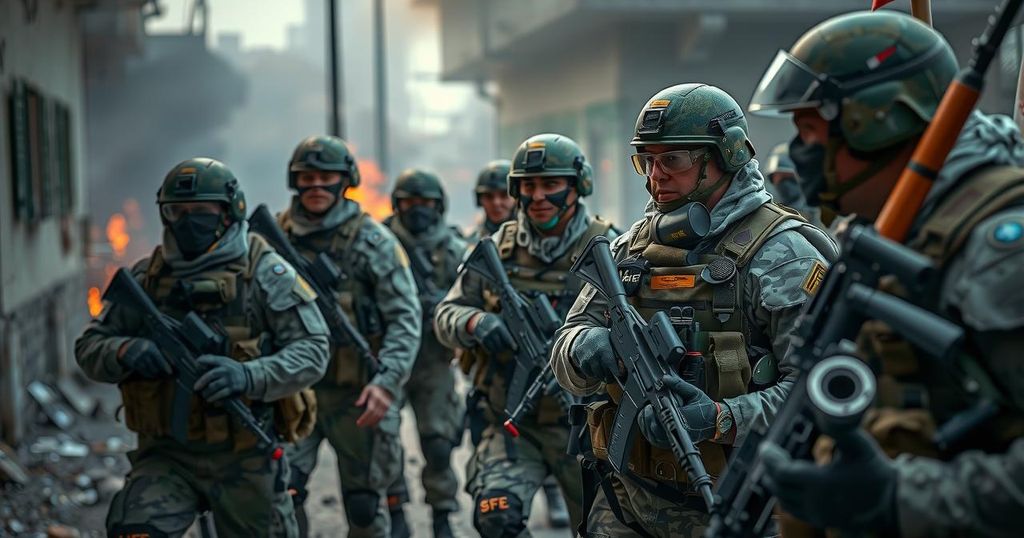The situation in southern Lebanon has reached a critical point with Israeli airstrikes causing civilian casualties and injuries to UN peacekeepers. Diplomatic talks led by US envoy Amos Hochstein have yet to yield visible progress towards resolution. Hezbollah’s retaliatory actions further complicate the landscape, as violations of humanitarian norms are reported. Amidst these tensions, the local populace grapples with panic and displacement as the violence escalates.
On Friday, fresh violence erupted in southern Lebanon as Israeli forces escalated their bombardment, resulting in the deaths of at least five medical personnel. This series of assaults coincided with remarks made by US envoy Amos Hochstein prior to his departure to Washington following consultations aimed at reaching a diplomatic resolution to the ongoing conflict between Israel and Hezbollah, which has persisted for 52 days. Hochstein’s discussions with Lebanese officials earlier in the week yielded no clear outcome.
In the west sector of Shamaa, the Italian contingent of UNIFIL reported injuries to four of its soldiers after their base was struck by two rockets. Addressing the situation, Italy’s Prime Minister Giorgia Meloni expressed her outrage regarding the attacks on UNIFIL’s Italian headquarters and urged immediate action to ensure the safety of peacekeepers. UNIFIL confirmed the incident and called on all parties involved to prevent combat near their positions.
Compounding these tensions, Israeli airstrikes were reported in Beirut’s suburbs, targeting civilian structures in Ain Al-Remmaneh, a predominantly Christian locality. Israeli troops advanced into southern territories, including Deir Mimas, resulting in orders for residents to remain in their homes. Local authorities emphasized the military’s increased presence in the region and its implications for civilian safety.
Furthermore, clashes were reported in Beirut as local residents reacted to evacuation warnings from the Israeli army, which preceded further airstrikes on residential areas causing significant destruction and panic among the population. Humanitarian concerns deepened as reports emerged of Israeli forces targeting ambulances associated with Hezbollah, resulting in fatal consequences for medical personnel. The Lebanese Ministry of Health condemned these actions as violations of international law.
Hezbollah retaliated by launching missiles at Israeli positions, claiming successes against Israeli armored units. Meanwhile, Israeli reconnaissance operations continued, heightening fears of further military actions against Lebanon. As communities celebrated the 81st anniversary of Lebanese independence, the somber backdrop of ongoing conflict served as a stark reminder of the nation’s overarching challenges, as articulated by parliamentary speaker Nabih Berri, who invoked the need for unity and resilience amidst adversity.
The ongoing conflict in Lebanon, primarily between the Israeli military and Hezbollah, has escalated significantly since it began, marked by continuous violence that has recently intensified. The presence of UN peacekeeping forces, specifically UNIFIL, has been compromised due to hostilities, leading to serious concerns regarding the safety of international personnel. The involvement of external diplomatic efforts, most notably by US envoy Amos Hochstein, signifies attempts to mediate a resolution, yet the lack of clear outcomes reflects the complexity of achieving lasting peace in the region.
The recent events in Lebanon underscore the escalating violence and humanitarian crisis as Israeli military operations intensify in response to Hezbollah’s actions. The involvement of international peacekeeping forces highlights the urgency for a diplomatic resolution to ensure the safety of civilians and UN personnel alike. Furthermore, the conflict’s toll on medical staff and infrastructure raises significant concerns internationally, demanding immediate attention to prevent further tragedies.
Original Source: www.arabnews.com






